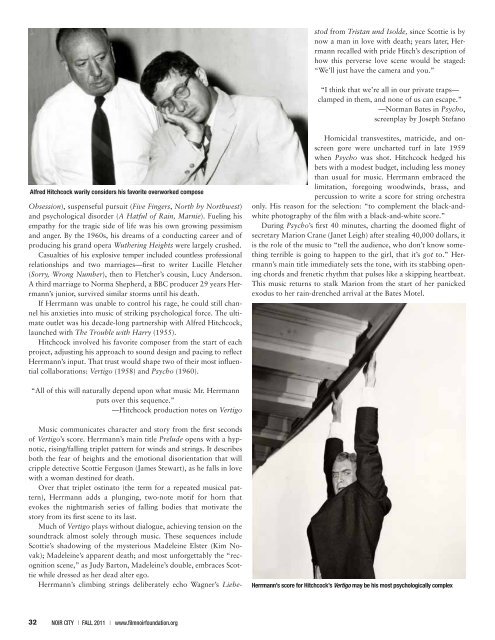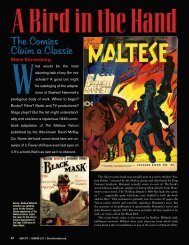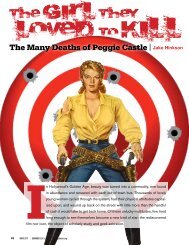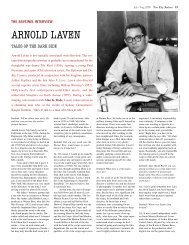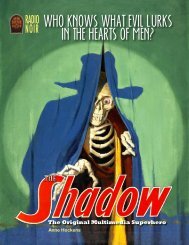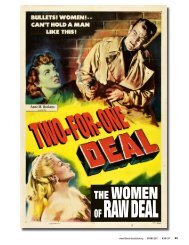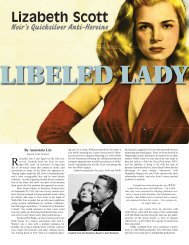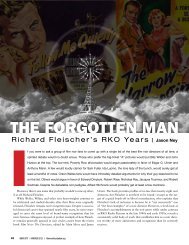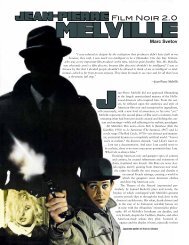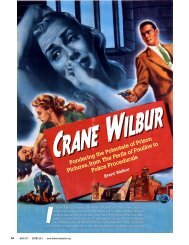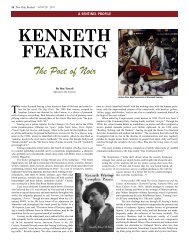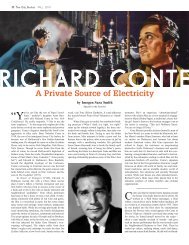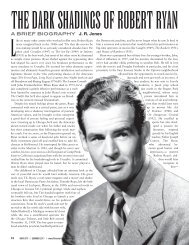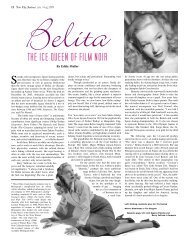BERNARD HERRMANN - Film Noir Foundation
BERNARD HERRMANN - Film Noir Foundation
BERNARD HERRMANN - Film Noir Foundation
Create successful ePaper yourself
Turn your PDF publications into a flip-book with our unique Google optimized e-Paper software.
Alfred Hitchcock warily considers his favorite overworked compose<br />
Obsession), suspenseful pursuit (Five Fingers, North by Northwest)<br />
and psychological disorder (A Hatful of Rain, Marnie). Fueling his<br />
empathy for the tragic side of life was his own growing pessimism<br />
and anger. By the 1960s, his dreams of a conducting career and of<br />
producing his grand opera Wuthering Heights were largely crushed.<br />
Casualties of his explosive temper included countless professional<br />
relationships and two marriages—first to writer Lucille Fletcher<br />
(Sorry, Wrong Number), then to Fletcher’s cousin, Lucy Anderson.<br />
A third marriage to Norma Shepherd, a BBC producer 29 years Herrmann’s<br />
junior, survived similar storms until his death.<br />
If Herrmann was unable to control his rage, he could still channel<br />
his anxieties into music of striking psychological force. The ultimate<br />
outlet was his decade-long partnership with Alfred Hitchcock,<br />
launched with The Trouble with Harry (1955).<br />
Hitchcock involved his favorite composer from the start of each<br />
project, adjusting his approach to sound design and pacing to reflect<br />
Herrmann’s input. That trust would shape two of their most influential<br />
collaborations: Vertigo (1958) and Psycho (1960).<br />
“All of this will naturally depend upon what music Mr. Herrmann<br />
puts over this sequence.”<br />
—Hitchcock production notes on Vertigo<br />
Music communicates character and story from the first seconds<br />
of Vertigo’s score. Herrmann’s main title Prelude opens with a hypnotic,<br />
rising/falling triplet pattern for winds and strings. It describes<br />
both the fear of heights and the emotional disorientation that will<br />
cripple detective Scottie Ferguson (James Stewart), as he falls in love<br />
with a woman destined for death.<br />
Over that triplet ostinato (the term for a repeated musical pattern),<br />
Herrmann adds a plunging, two-note motif for horn that<br />
evokes the nightmarish series of falling bodies that motivate the<br />
story from its first scene to its last.<br />
Much of Vertigo plays without dialogue, achieving tension on the<br />
soundtrack almost solely through music. These sequences include<br />
Scottie’s shadowing of the mysterious Madeleine Elster (Kim Novak);<br />
Madeleine’s apparent death; and most unforgettably the “recognition<br />
scene,” as Judy Barton, Madeleine’s double, embraces Scottie<br />
while dressed as her dead alter ego.<br />
Herrmann’s climbing strings deliberately echo Wagner’s Liebe-<br />
32 NOIR CITY I FALL 2011 I www.filmnoirfoundation.org<br />
stod from Tristan und Isolde, since Scottie is by<br />
now a man in love with death; years later, Herrmann<br />
recalled with pride Hitch’s description of<br />
how this perverse love scene would be staged:<br />
“We’ll just have the camera and you.”<br />
“I think that we’re all in our private traps—<br />
clamped in them, and none of us can escape.”<br />
—Norman Bates in Psycho,<br />
screenplay by Joseph Stefano<br />
Homicidal transvestites, matricide, and onscreen<br />
gore were uncharted turf in late 1959<br />
when Psycho was shot. Hitchcock hedged his<br />
bets with a modest budget, including less money<br />
than usual for music. Herrmann embraced the<br />
limitation, foregoing woodwinds, brass, and<br />
percussion to write a score for string orchestra<br />
only. His reason for the selection: “to complement the black-andwhite<br />
photography of the film with a black-and-white score.”<br />
During Psycho’s first 40 minutes, charting the doomed flight of<br />
secretary Marion Crane (Janet Leigh) after stealing 40,000 dollars, it<br />
is the role of the music to “tell the audience, who don’t know something<br />
terrible is going to happen to the girl, that it’s got to.” Herrmann’s<br />
main title immediately sets the tone, with its stabbing opening<br />
chords and frenetic rhythm that pulses like a skipping heartbeat.<br />
This music returns to stalk Marion from the start of her panicked<br />
exodus to her rain-drenched arrival at the Bates Motel.<br />
Herrmann’s score for Hitchcock’s Vertigo may be his most psychologically complex


